
CANADIAN JOURNAL OF FOREST RESEARCH
Scope & Guideline
Pioneering research for a greener tomorrow.
Introduction
Aims and Scopes
- Forest Ecology and Dynamics:
Research focusing on the ecological dynamics of forest ecosystems, including species interactions, biodiversity, and the impacts of climate change on forest composition and structure. - Forest Management and Silviculture:
Studies on various forest management practices, including thinning, harvesting techniques, and their effects on forest health, productivity, and ecological balance. - Climate Change Impact Assessments:
Investigations into how climate variability and extreme weather events affect forest ecosystems, focusing on adaptation strategies and resilience. - Forest Products and Utilization:
Research on the properties and utilization of forest products, including wood quality, biomass production, and the economic aspects of forest resource management. - Restoration and Rehabilitation:
Studies aimed at understanding and improving forest restoration techniques, particularly in the aftermath of disturbances such as fire, pests, and human activities. - Technological Advances in Forestry:
Exploration of new technologies in forest measurement and management, including remote sensing, modeling, and data analysis techniques to support sustainable forestry.
Trending and Emerging
- Climate Resilience and Adaptation Strategies:
An increasing number of studies are focusing on how forest ecosystems can adapt to climate change, emphasizing resilience strategies that enhance forest health and productivity. - Carbon Sequestration and Climate Mitigation:
Research related to carbon storage in forests and the role of forestry in climate change mitigation is trending, highlighting the importance of forests as carbon sinks. - Technological Integration in Forest Research:
The adoption of advanced technologies such as LiDAR, remote sensing, and machine learning for forest inventory and management is on the rise, reflecting a shift towards data-driven decision-making. - Ecological Restoration Practices:
There is a growing interest in ecological restoration practices aimed at rehabilitating disturbed forest areas, with a focus on biodiversity recovery and ecosystem services. - Forest Health and Pest Dynamics:
With increasing concerns over pest outbreaks and forest health, studies examining the interactions between climate change and pest dynamics are becoming more prominent.
Declining or Waning
- Invasive Species Management:
Research on invasive species impact and management strategies has decreased, possibly reflecting a shift towards more pressing issues like climate change adaptation and forest resilience. - Traditional Forest Products:
The focus on non-timber forest products and traditional forest uses appears to be declining, as contemporary research increasingly prioritizes ecological and economic assessments of timber management. - Historical Forest Ecology:
Studies emphasizing historical perspectives on forest dynamics and management have diminished, likely as the field shifts toward real-time ecological monitoring and adaptive management practices. - Forest Policy and Socioeconomic Studies:
There is a noticeable reduction in papers analyzing forest policy frameworks and socioeconomic impacts, suggesting a trend towards more technical and ecological research. - Forest Fire Management Strategies:
While fire management remains important, the volume of research specifically focusing on traditional fire management strategies has waned, possibly due to a broader focus on fire ecology and climate interactions.
Similar Journals
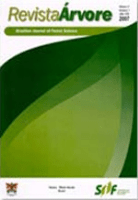
REVISTA ARVORE
Connecting Scholars to Advance Forestry ScienceREVISTA ARVORE is a distinguished, peer-reviewed journal in the field of Forestry, published by Universidade Federal de Viçosa in Brazil. Renowned for its commitment to open access since 2002, this journal facilitates the dissemination of innovative research and knowledge to a global audience, encompassing topics from sustainable forest management to ecological conservation. With an impact factor reflective of its engagement in the community and a current Scopus ranking that places it in the 28th percentile among journals in Agricultural and Biological Sciences, it provides a vital platform for both emerging and established scholars. The journal is indexed under ISSN 0100-6762 and E-ISSN 1806-9088, making it accessible to a wide readership. As it converges its publication years from 2006 to 2024, REVISTA ARVORE aims to contribute significantly to the advancement of forestry science and practices, thereby encouraging environmental sustainability and innovation within the field.

EUROPEAN JOURNAL OF FOREST RESEARCH
Advancing Forest Science for a Sustainable FutureThe European Journal of Forest Research (ISSN: 1612-4669; E-ISSN: 1612-4677), published by Springer, stands at the forefront of advancing the field of forestry and plant sciences. With a distinguished reputation reflected in its Q1 category rankings in both Forestry and Plant Science for 2023, this journal excels in disseminating high-quality research that addresses the critical challenges facing forest ecosystems across Europe and beyond. Established in Germany, the journal has transitioned through various phases since its inception in 1996, striving to integrate innovative research findings that promote sustainable forest management and conservation strategies. As part of a rich academic tradition, it boasts a commendable ranking within the Scopus database, placing it in the top echelons of its category. Researchers and practitioners alike can benefit from its commitment to open access options, ensuring that cutting-edge studies are accessible to a global audience. The European Journal of Forest Research serves as an essential platform for knowledge exchange, aiming to enhance the understanding of forest dynamics and improve the management of forest resources in the face of a changing climate.
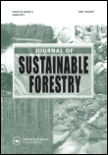
Journal of Sustainable Forestry
Empowering knowledge for sustainable forestry solutions.Journal of Sustainable Forestry is a premier academic publication dedicated to advancing knowledge and practices in the field of sustainable forestry and environmental management. Published by Taylor & Francis Inc in the United Kingdom, this journal has been a cornerstone for researchers and professionals since its inception in 1992. With an impressive reputation, it boasts a 2023 Q2 ranking in Food Science, Forestry, and Geography, Planning and Development, highlighting its significant contribution to interrelated disciplines. The journal’s impact is further underscored by its Scopus ranking, especially in Forestry where it holds the 43rd position out of 174 publications, placing it in the 75th percentile. Although not open access, the journal remains committed to providing innovative research and practical insights into forest management, ecological sustainability, and policy development. As the field of sustainable forestry continues to evolve, the Journal of Sustainable Forestry serves as an essential resource for those committed to advancing sustainable practices globally, fostering a deeper understanding of how sustainable forestry can contribute to environmental resilience and biodiversity conservation.
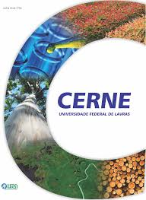
Cerne
Driving Impactful Research in Forestry and BiodiversityCerne is a distinguished open-access journal dedicated to advancing knowledge in the field of forestry, published by the Universidade Federal de Lavras (UFLA). Since its inception in 1994, the journal has actively contributed to the global discourse on sustainable forest management and biodiversity conservation, presenting research findings that are both relevant and impactful. With its ISSN 0104-7760, Cerne aims to foster collaboration among researchers, professionals, and students, enhancing the understanding of forestry practices in Brazil and beyond. As of 2023, it holds a respectable Q3 ranking in the forestry category, further cementing its position within the academic community, illustrated by a Scopus ranking of #97 out of 174 in the Agricultural and Biological Sciences - Forestry field. Operating under an open-access model allows for wide dissemination of research outputs, ensuring that critical findings reach a broad audience, fueling further innovation and discovery in the field. With converged years extending from 2007 to 2024, Cerne continues to be a vital resource for anyone engaged in forestry research and practices.

Sylwan
Exploring innovative solutions for ecological forestry.Sylwan, published by POLSKIE TOWARZYSTWO LESNE, is a key journal in the field of forestry, focusing on the science and practice of sustainable forest management and conservation. Operating since 1979 and releasing issues periodically, including those from 2011 to 2018 and from 2020 to 2024, this journal plays a vital role in disseminating research and advances in forestry practices particularly relevant to Poland and the broader European context. While currently not offering open access options, Sylwan maintains a Q4 ranking in the forestry category according to the Scopus database, highlighting its dedicated niche within the scientific community. The journal serves as an essential resource for researchers, professionals, and students seeking to enhance their understanding of forestry issues in a global and ecological framework. With a commitment to promoting innovative research, Sylwan supports the ongoing dialogue on forestry management and policies, ultimately contributing to the sustainable development of forest resources.
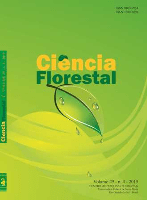
CIENCIA FLORESTAL
Exploring Innovative Research in Forest ScienceCIENCIA FLORESTAL is a premier open-access journal published by the Universidade Federal de Santa Maria, dedicated to advancing knowledge in the field of Forestry. Established in 1991, it provides a vital platform for researchers, professionals, and students to disseminate innovative research findings and methodologies. With an ISSN of 0103-9954 and an E-ISSN of 1980-5098, this journal offers extensive access options for a global audience, ensuring that key scientific discoveries in forest science are available to all. The journal is recognized for its contribution to the scholarly community, currently ranked in the Q3 category within the Forestry discipline, reflecting its commitment to quality and relevance in research. CIENCIA FLORESTAL covers a wide array of topics related to forestry practices, environmental sustainability, and biological sciences, making it an essential resource for those seeking to deepen their understanding of forest ecosystems and their management. Whether you’re a seasoned researcher or a student embarking on your academic journey, CIENCIA FLORESTAL stands as an invaluable asset in the exploration and development of forestry sciences in Brazil and beyond.
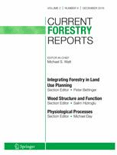
Current Forestry Reports
Leading the charge in innovative forest ecosystem management.Current Forestry Reports, published by Springer International Publishing AG, stands at the forefront of forestry and ecological research, boasting an impressive array of quartile rankings in 2023 such as Q1 in Ecology and Forestry. With an ISSN of 2198-6436, this journal has emerged as a pivotal platform for disseminating innovative research findings and insights critical to the sustainable management of forest ecosystems. Operating out of Switzerland, it covers a broad scope that spans from ecological theory to practical forestry applications and landscape conservation. Notably, it ranks #3 out of 174 in Agricultural and Biological Sciences: Forestry and #4 out of 211 in Environmental Science: Nature and Landscape Conservation, reflecting its high impact and relevance in the field, placing it in the top percentiles in multiple categories. This open-access journal endeavors to provide a comprehensive understanding of contemporary issues, trends, and methodologies in forestry and related disciplines, making it an indispensable resource for researchers, practitioners, and students who are dedicated to advancing knowledge and practices in forest science.

BALTIC FORESTRY
Innovating Research for Tomorrow's ForestsBALTIC FORESTRY, published by the INST FORESTRY LRCAF in Lithuania, is a prominent academic journal that serves as a platform for disseminating cutting-edge research in the field of forestry. With an ISSN of 1392-1355, this journal is dedicated to advancing knowledge on sustainable forest management, ecological impacts, and resource conservation, among other vital topics. As of 2023, it has been categorized in the Q3 quartile for forestry in Scopus, indicating its solid reputation among peer-reviewed publications, ranking #95 out of 174 in the realm of Agricultural and Biological Sciences. BALTIC FORESTRY features contributions from researchers across the globe and encourages innovative approaches to solving contemporary challenges in forestry, making it an essential resource for professionals, scholars, and students alike. Although it operates under subscription-based access options, the journal's commitment to fostering academic discourse is unwavering, aiming to bridge the gap between theory and practice in forest science.

Revista Cubana de Ciencias Forestales
Exploring the intersection of ecology and conservation.Revista Cubana de Ciencias Forestales, published by UNIV PINAR RIO HERMANOS SAIZ MONTES OCA, is a vital resource in the field of forestry and environmental sciences. Since its inception in 2013, this Open Access journal has dedicated itself to disseminating high-quality research and innovations pertinent to forest ecology, sustainable management, and conservation strategies within the Cuban context and beyond. The journal aims to foster academic dialogue among researchers, professionals, and students by providing a platform for the sharing of interdisciplinary studies that address contemporary challenges in forestry. With its commitment to accessibility, Revista Cubana de Ciencias Forestales ensures that knowledge is available to a global audience, thereby contributing to the advancement of forest sciences and ecological awareness.

Austrian Journal of Forest Science
Driving excellence in forest conservation and management.Austrian Journal of Forest Science, published by OSTERREICHISCHER AGRARVERLAG, is a distinguished peer-reviewed journal dedicated to advancing knowledge in the fields of forestry and ecological science. With an ISSN of 0379-5292 and an E-ISSN of 0375-524X, this journal serves as a vital platform for researchers, professionals, and students alike, aiming to disseminate innovative research findings, methodologies, and case studies pertinent to forest conservation, management, and policy. Situated in Austria, its diverse scope encompasses critical topics within ecology, evolution, and biodiversity, evidenced by its competitive quartile rankings in 2023, placing it in Q2 for Forestry and Q3 in other related fields. The journal is committed to fostering a deeper understanding of forest ecosystems, making it an essential resource for anyone invested in sustainable forestry practices and environmental policy.